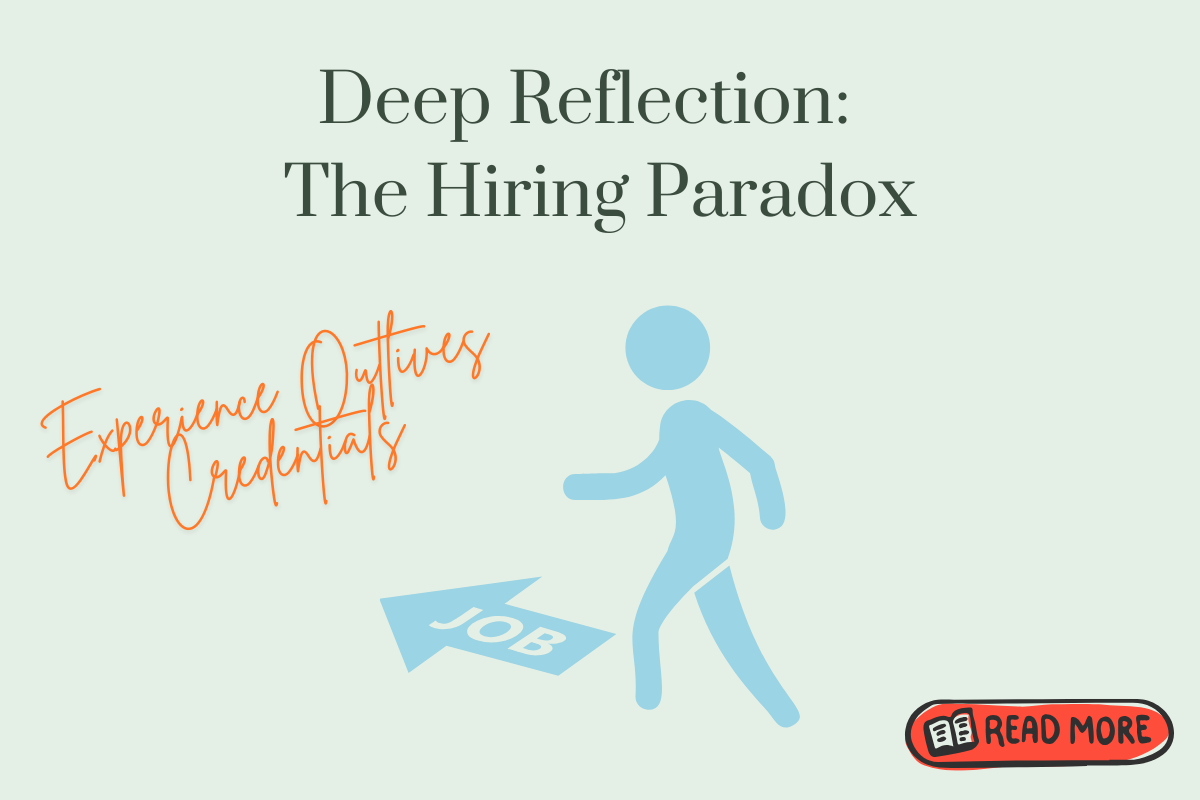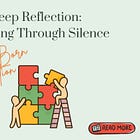Deep Reflection Series 2.11 – Hiring Paradox #WorkCulture
When Experience Loses to Credentials

🖌️ In our ongoing exploration of modern professional life, this installment confronts a glaring contradiction: the systematic devaluation of human experience in favor of paper credentials. While previous reflections examined creativity and innovation (2.10), here we dissect how arbitrary gatekeeping stifles both, creating a paradox where proven ability bows to institutional validation.
The Corporate Credential Trap
"Submit your applications through our portal," they say. But what they mean is: "Prove your worth through our algorithmic gates." Today's hiring practices have devolved into a bureaucratic maze where decades of success mean less than a freshly printed diploma. This isn’t just inefficient; it is actively hostile to human potential.
Real Stories of Resistance
Meet Sarah Chen, a self-taught developer who built three successful apps but couldn't get past HR's automated screenings. "Their system couldn't comprehend that someone might learn outside a classroom," she notes with irony. Yet today, she leads development at a fintech startup that recognized value over validation.
Marcus Weber's story cuts deeper into the absurdity. In private banking, where credentials reign supreme, he outperformed MBA-holding colleagues through genuine client relationships. "While they framed certificates, I built trust," he explains. His portfolio's 40% higher retention rate speaks volumes about what really matters in client relationships.
These aren’t isolated cases; they are symptoms of a broken system.
The Historical Trap
Today's obsession with credentials didn't emerge by accident. It's the product of industrial-era thinking that prioritized standardization over skill, compliance over creativity.
From Craftsmanship to Conformity
Time was, a blacksmith's worth lay in their forge work, not their framed certificates. Apprenticeships meant learning by doing, guided by those who'd mastered their craft through experience. But the industrial revolution's demand for standardization began valuing paper over practice.
The Digital Facade
Now, in an era that claims to value innovation, we've somehow made things worse. Automated Tracking Systems (ATS) act as digital bouncers, rejecting experienced professionals for lacking keyword-optimized credentials. The irony? These systems, designed for efficiency, excel at filtering out exactly the kind of unconventional thinking companies claim to want.
The Numbers Behind the Nonsense
Let's talk data:
➤ 85% of positions requiring degrees don't actually need them
➤ Companies fixated on credentials see 50% higher turnover
➤ With student debt averaging €34,000 (~$37,000), many graduates are left questioning whether their credentials justify the cost.
➤ Diverse hiring jumps 70% when degree requirements drop
Yet HR departments cling to their checkboxes ☑︎ , claiming "quality control" while bleeding talent.
Breaking Free: The Worker's Perspective
Smart professionals aren't waiting for permission anymore. They're creating their own paths:
Building Alternative Proof
→ Portfolio development over degree collection
→ Direct client relationships that bypass HR barriers
→ Open-source contributions that demonstrate real skills
→ Personal brands that speak louder than credentials
The Global Credential Maze
Corporate obsession with credentials knows no borders. While U.S. corporations worship degrees, European companies navigate an even more complex maze of EU bureaucratic requirements. Brussels' standardization directives, meant to ensure qualification compatibility across borders, have ironically created a credential arms race. HR departments in Paris, Frankfurt, and Milan hide behind EU compliance requirements, using them as justification for ever-more-rigid credential demands.
Yet alternatives exist within this same global system. Germany's dual education system somehow survives within the EU framework, proving practical training can coexist with bureaucracy. Singapore's SkillsFuture program demonstrates state-backed alternatives to credential worship, while Australia's recognition of prior learning (RPL) system actively values experience over paper qualifications.
The irony? These successful models exist in highly regulated environments, revealing how corporate credential fetishism is a choice, not a necessity. Whether it's American HR's degree obsession or European bureaucratic compliance, the result is the same: authentic talent forced to play a game rigged against practical experience.
The Real Cost of Credential Worship
Beyond the obvious financial burden, credential requirements exact deeper tolls:
Innovation stifled by conformity requirements
Diverse perspectives filtered out by arbitrary standards
Experienced professionals forced into unnecessary debt
Genuine talent driven to competitor markets
☞ The Real Ghosting Story: HR's Disappearing Act
Let's talk about who's really ghosting whom. While companies complain about candidate ghosting, the truth is far more troubling: HR departments have turned ghosting into an art form, leaving countless qualified professionals in limbo.
"After four rounds of interviews and a full-day technical assessment, they simply vanished,” shares James Martinez, a senior developer with fifteen years of experience. “No feedback, no closure, just silence. Then six months later, they had the audacity to reach out about a different role, acting as if nothing had happened.”
This isn’t an isolated incident. It is systematic disrespect. Maria Chen spent weeks going through a rigorous interview process, even preparing a comprehensive presentation. “They demanded increasingly more of my time and energy, then disappeared without a word. I later discovered they had promoted internally all along. The external search was just a corporate requirement.”
The excuse of being “too busy” to respond doesn’t hold water. Automated rejection emails take minutes to set up, yet many HR departments can’t be bothered with even this basic courtesy. What they forget is that respect costs nothing, but its absence costs everything. It damages reputation, limits access to top talent, and erodes professional goodwill.
Even worse is the growing practice of ghosting candidates after multiple interview rounds or assessments. This behavior reveals a fundamental truth: many HR departments view job seekers not as valuable professionals worth respecting, but as disposable commodities in their talent acquisition assembly line.
The solution is simple. Treat people with the respect they deserve. Provide clear timelines, honest feedback, and proper closure. It is not just professional courtesy. It is basic human decency.
The Future We're Building
While HR departments debate incremental changes, professionals are creating alternative futures:
Worker-Led Innovation
☞ Building independent portfolios that prove real value
☞ Creating networks that bypass traditional gatekeepers
☞ Developing skill-based communities that share opportunities
☞ Starting ventures that value results over resumes
The Power Shift
The greatest irony? Companies desperately seeking "innovative thinking" can't recognize it in their hiring processes. But the tide is turning. As more talented professionals choose independence over institutional validation, traditional hiring faces a reckoning.
🗯️ Reflective Closing
Experience isn't just a number on a resume; it's the living proof of capability, innovation, and real-world impact. Through authentic demonstration of skills and practical achievements, we transcend the artificial barriers of credential gatekeeping.
🤔 What's Next? Transform your experience into opportunity:
What unique skills have you developed outside traditional education? How could you showcase your practical expertise in ways that bypass traditional gatekeepers?
Try this: Create a 30-day portfolio challenge. Document one significant achievement or learning each day. Watch how your narrative of experience grows stronger than any credential.
New to this journey? Start with Creativity and Innovation (2.10), a reflection on how freedom from convention can ignite new ways of thinking.
👉 Stay tuned for the next instalment of the Deep Reflection Series as we continue thinking outside the box while exploring the depths of human potential, authentic value, and the future of professional recognition.
—#WorkCulture— by Ellis Zeitmann for ThinkZeit
#WorkCulture #ExperienceMatters #DeepReflections #ThinkingOutsideTheBox #AuthenticValue #ProfessionalGrowth #CareerDevelopment #Innovation #Leadership #HumanPotential #ModernWork #CareerEvolution #TalentRevolution #WritingCulture #ThinkZeit



